From the Council Chamber July 30, 2024
By Greens Councillor Miranda Korzy
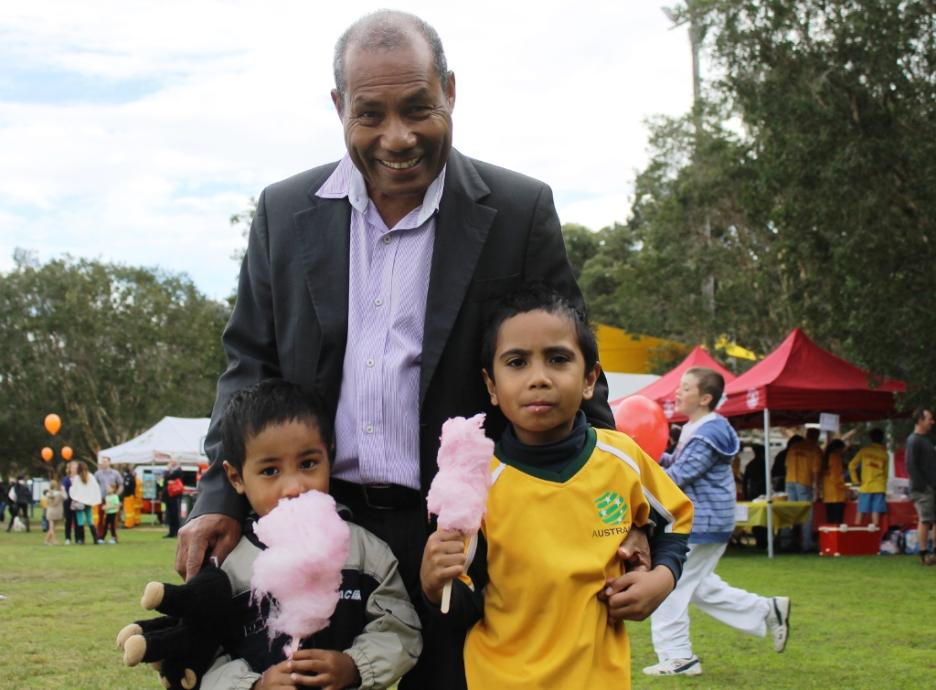
His Excellency Abel Guterres, Timor Leste's Ambassador to Australia and family, at the Avalon Tattoo in 2014. Photo: A J Guesdon
Council agenda overrun
Standby for Part Two of last week’s council meeting, which was adjourned after nearly five hours debate, with plans to reconvene at a special session next Tuesday night, August 6, at 6pm.
Last week’s meeting ran from 6pm to 10.53pm, during which we heard speeches from the community, debated only seven items from the agenda and passed another six by exception (that is, in a block without debate). Remaining on the agenda were 22 items, some of them leftover from the June 25 meeting. An extra meeting was also held last month to consider the 2024-2025 budget.
Northern Beaches Council meetings are notorious for lasting until 11.30pm - and going even later on occasion last term. However, a simple tally of motions on the agenda will reveal where the problem lies. Apart from the procedural items, of the 33 on last week’s agenda, only 22 related to Pittwater - and some of those were of a general nature.
What we covered
An Aboriginal and Torres Strait Islander Advisory Group was approved for council in a vote at Tuesday’s meeting. To proceed, council would have to reallocate funding of up to $200,000 to support it. However, a rescission motion submitted the following day by Pittwater Liberal Councillors Karina Page and Michael Gencher as well as Curl Curl Liberal David Walton, could scupper this pathway for consulting with our First Nations community. The rescission motion will be debated at the final council meeting for this term on August 13.
Councillors did manage to discuss a controversial new draft of the Council's Code of Meeting Practice. After significant pushback from the community, we dropped the proposal to cut speaking time at meetings for community members and councillors from three to two minutes. The document will now go on public exhibition.
I was also delighted that another staff proposal to scrap our Sister Cities arrangements has been sent back for a review to be provided to the new council next year - after Pittwater's leader of the Friends of Soibada Tamara Sloper-Harding addressed the meeting outlining the benefits our existing link with that community could provide to them and us.
Finally, councillors voted to support continuation of the Cubby House Toy Library service at Mona Vale and Manly Libraries from 10.30am to 11am on Thursdays.
What to look out for next week
Things to look out for at the resumed meeting on Tuesday will include my motion for a review of tree stewardship and a new tree management policy for the Northern Beaches (given we currently have three separate ones operating). We don’t want a repeat of the Ruskin Rowe fiasco and I believe this motion would achieve that.
At Ruskin Rowe, council decided in June to remove four Flooded Gums (Eucalyptus Grandis) which had shed branches, one causing severe damage to a car, and which council arborist reports said were of high risk.
However, the Avalon community has opposed this removal, including two Avalon arborists, one of them a Level 8 with an Environmental Law degree and the other, Paul Shearer, with many years experience carrying out risk assessments on trees in school ground. These experts told me the trees presented a low risk to the community. Whilst two of the trees were likely to be more difficult to manage into the future and were removed, neighbours and others including members of Canopy Keepers, Pittwater Natural Heritage Association, the Greens and Labor’s Environment Action Network, set up a blockade guarding the remaining two.
Mr Shearer carried out his own risk assessment of the trees and provided a report to the blockaders. We also commissioned an assessment by another extremely experienced arborist, Mark Hartley, who used a different methodology but came to the same conclusion as Mr Shearer. This was in contrast to the advice to council.
Local ecologist Elaway Dalby-Ball has now spoken at the last two council meetings condemning what she says is council’s failure to follow standard processes when assessing trees and checking for wildlife within them. Mr Shearer, in a speech to council on June 25, also noted discrepancies in council reports, and that their “recommendations contradict industry standards”. He cited “erroneous identification of dwellings as potential targets” (ie no dwellings are near the subject trees), the recommendation for the removal of the two Flooded Gums “despite the threshold for risk mitigation not being met, and the suggestion to remove the trees when the risk could be mitigated by removing potential targets”.
Similarly, Mr Hartley’s report concluded: “There is nothing that suggests that the risk associated with either of these trees is outside of the broadly acceptable range. While these trees do shed live branches at a higher rate than some other species of trees, even when this is taken into consideration, the level of risk does not merit any action being taken.
“Even if the health benefits from trees are reduced to an almost negligible amount, greater harm would still be done by removing the trees rather than dealing with an occasional branch failure.”
With our new Tree Canopy Plan approved last September, I believe it is now timely to develop a single tree management policy based on the plan, as well as to take stock of our management practices and budget needed to keep our mature trees in place for as long as possible.
Another motion I raised for the June 25 meeting, electrifying new developments with a ban on gas connections, also remains on the agenda. Given the climate crisis, you might have thought the state government would encourage this pathway. However, councils are not permitted to ban gas on climate grounds. Ironically, we could do it in our Development Control Plan for any other reason.
At the June 25 meeting a local health industry professional Sarah Baker and climate lobby 350.org spokesman James Conlan both addressed the meeting about how purely electrifying new developments would save residents money - in the midst of a cost of living crisis - and improve the health of residents. Former Warringah Councillor Conny Harris, a GP, then spoke at Tuesday’s meeting about the council’s responsibility to safeguard community health - and how a gas ban would lead to significant health benefits.
Also carried over will be a motion from retiring Frenchs Forest Councillor Stuart Sprott, calling for smart tree management, in the form of a review of the impacts and costs associated with replacement planting of exotic trees releasing lots of seed with local natives.
Pittwater Liberal Councillor Karina Page will call for a review of ways to prevent boat and trailer parking in residential and industrial streets across the LGA, and has another motion up for a review of sportsground allocations.
And Narrabeen Independent Councillor Vince De Luca has proposed calling on the NSW government and opposition to return funding for youth mental health beds at Northern Beaches Hospital and to introduce incentives, in the form of reductions to HECS debts, for students studying psychiatry and other mental health disciplines.
Finally, a call by Curl Curl Greens Councillor Kristyn Glanville and Manly Liberal Georgia Ryburn to modernise signage at surfing heritage sites across the Northern Beaches as well as to find ways of recognising our local female surfing pioneers and their stories, will also be carried over from the June 25 and last week’s meeting.
Join the fun!
If you feel strongly about any of the issues on the agenda for Tuesday’s resumption of the July 30 meeting, please join the meeting in the gallery to send a message to councillors about what’s important to the community!
Tamara Sloper-Harding OAM
Re: Item 8.1: Diplomatic Ties and Civic Relationships (In 2019, Council resolved to undertake public consultation on a draft Diplomatic Ties and Civic Relationships Policy, however this matter remained in abeyance and is now being reported back to Council. Recommendation was That Council: Not proceed with the draft Diplomatic Ties and Civic Relationships Policy.)
Tamara Sloper-Harding, Chair of Friends of Soibada, was speaking against this Item
Three minutes is not nearly enough time to adequately speak of the 15 year friendship between the northern beaches community and the small impoverished mountain village of Soibada in Timor Leste. Nor to outline the benefits of such a friendship to both communities.
It was initiated in 2009 by primary school children in Avalon after hearing my ANZAC Day speech about peace. They were so moved by the stories of the children in a country only an hour away from Australia and they wanted to help them. When Pittwater Council Mayor, Harvey Rose heard of this and met with his Excellency Abel Gutterres, the former Timor Leste Ambassador it was decided that the Northern Beaches would become one of the over 50 government-to-government friendship Agreements. This is further reaching than something between our local communities and was initiated at a higher level of government but designated to local councils to action.
The official friendship agreement was signed in 2010 by Mark Ferguson (GM Pittwater Council) and the District Administrator of Soibada. Soibada was selected for the Northern Beaches by the Timorese Government because it was in dire need. It is so remote and difficult to reach that aid often does not make it to the community. The first school in Timor built by the Portuguese over 400 years ago was in Soibada. All of the current leaders of the country were educated there. Hence the village became a target of the militia during the fight for Independence. The current President of Timor Leste was educated in Soibada and is patron of the charity, Friends of Soibada.
Australia has a debt of honour to the Timorese. They protected our troops during WW2 and we promised them friendship and support. When the Australians were evacuated over 40,000 Timorese were killed in reprisal. We promised to never forget our friends in Timor and to stand by them as they had us. We abandoned them when they were invaded in 1975. It was not until the INTERFET Peacekeeping Deployment of 1999 that we came close to making amends. The Timorese people suffered 24 years of brutal occupation resulting in more than 200,000 dead. I must add that I was a part of that peacekeeping operation and I was very much supported by the community here on the Northern Beaches during that conflict.
The Northern Beaches community became so invested in the relationship that Friends of Soibada registered as a charity with the ACNC. Rotary Clubs, Churches of all denominations, community groups, Surf lifesaving Clubs, RSL Clubs and RSL Sub Banches, businesses and schools have all become involved. At present there are over 18 schools participating in projects with Soibada.
The charity focuses on 3 main areas, Medical and Health, education and community development. Volunteers from the Northern Beaches work in all aspects of this both here at home and in country. There is a lot of information available online about the projects. All our volunteers are self-funded. There are no administration costs and all funds raised go towards projects in the village.
There is no running water in Soibada and some parts of the village only recently got electricity. Over 50% of the children are malnourished. The poverty is horrendous. However, the community does not want handouts. They want training and education so that they can help themselves. We are attempting to restore the dignity stolen from them during all those years of oppression.
There are many benefits to the community of the Northern Beaches through involvement.
The mental health benefits of volunteering and being a part of something bigger than ourselves are tremendous. For example, the weekly knitting and crochet group that meets and makes blankets and baby clothes to send to Soibada get to see the difference they are making in the lives of the women and children.
Duke of Edinburgh students volunteer with us and School children are gaining an insight into the values of social justice teachings
There are many cost-free ways our council and community can continue to support our sister village Soibada.
My final statement would be – that we made a promise, as a community we signed an agreement of friendship and support. Are we going to let the Timorese down again when we have groups of willing volunteers here on the beaches?
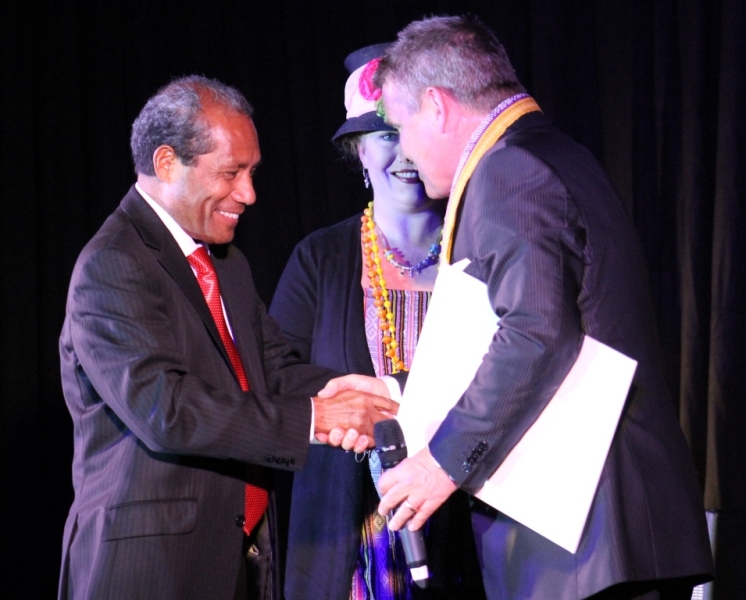
His Excellency Ambassador Abel Guterres thanking Tom Burlinson for his performance with a traditional scarf at Songs for Soibada, 2013. Photo: A J Guesdon
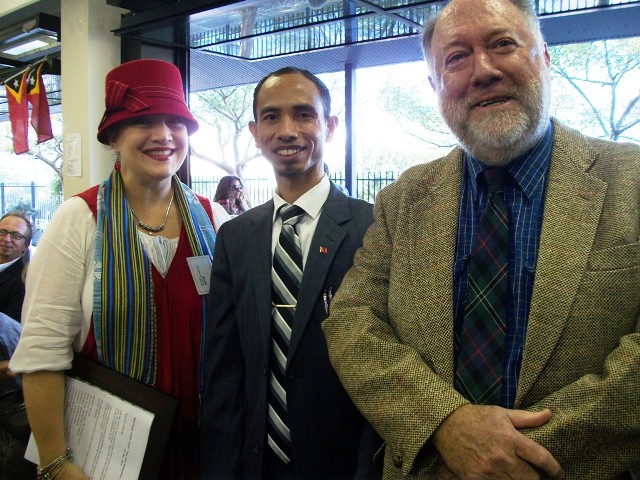
Above: Tamara Sloper-Harding, Chair of the Pittwater Friends of Soibada, Consul Fonseca Dos Santos Pereira of the Consulate-General of the Democratic Republic of Timor-Leste in Sydney and Councillor Harvey Rose, Mayor of Pittwater at Maria Regina Catholic School, Avalon in 2012. Photo: A J Guesdon
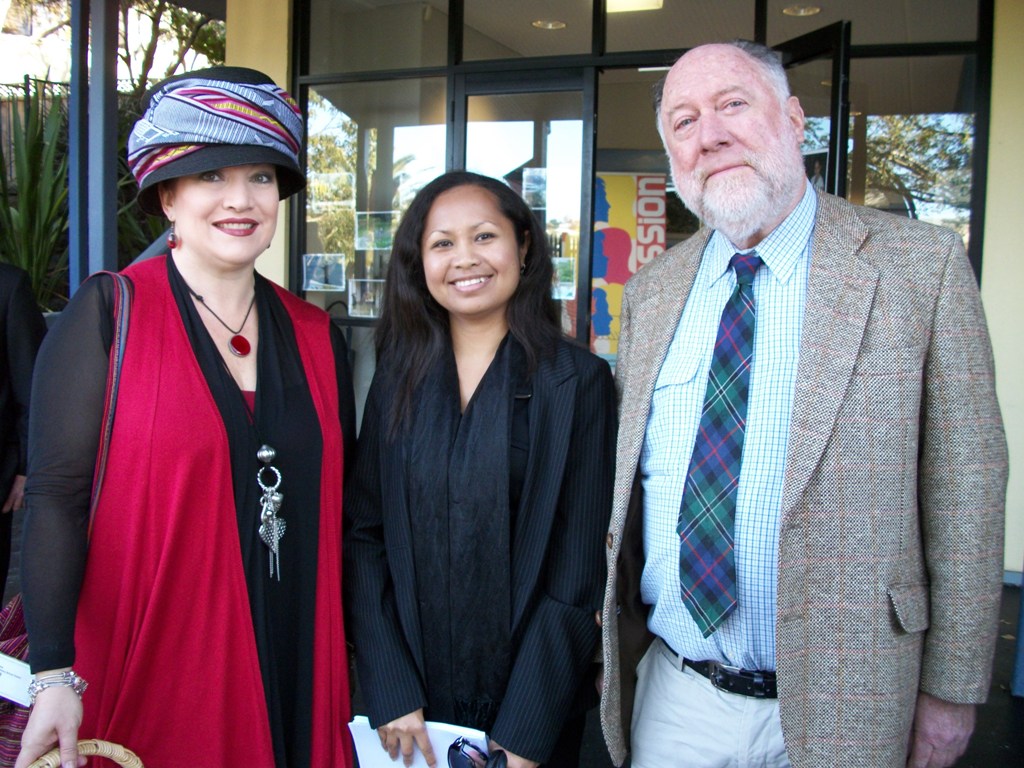
Tamara Sloper Harding, Consul-General Maria Jose and Mayor Rose in 2011. Photo: A J Guesdon
Jayden Walsh: Geology Public Address
Dear Madam Mayor and Councillors, my name is Jayden Walsh and I’m a professional Ecologist, Bush Regenerator and Environmental Educator. Over the next few meetings, I’m going to provide you with basic concepts of Ecology that are crucial to understand as decision-makers who frequently vote on matters that are of huge consequence to the natural environment.
Here on the Northern Beaches we are part of the Bioregion called the ‘Sydney Basin’. This bioregion extends from Newcastle in the North down to about Jervis Bay in the south and Lithgow in the west. The rocks and soils of this bioregion are split into 2 broad groups - Hawkesbury Sandstones and the ‘Narrabeen group’ - a variety of shales, mudstones, claystones and other nutrient rich soils.
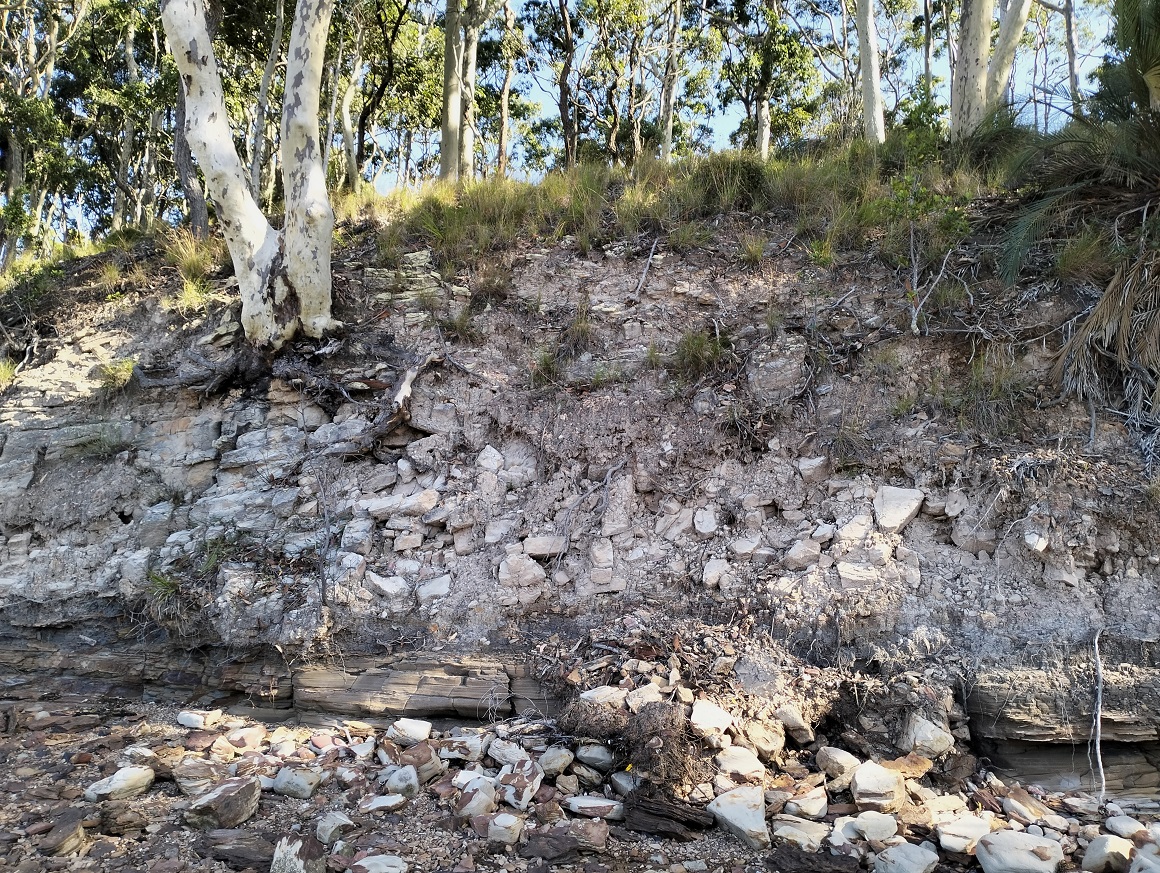
Pittwater Wagstaff Spotted Gum Forest EEC grows on various soil types of the Narrabeen Group. All very soft, nutrient rich and highly erodible.
The inconceivable changes experienced by what we consider the static Northern Beaches happened over a very long time. As Heraclitus said “Nothing is, everything is becoming”. The Narrabeen Group of rock types occurs from Collaroy up through to Palm Beach and through Ku-ring-gai Chase NP to Duffys Forest. The Narrabeen Group began forming approximately 250 million years ago following the Permian mass extinction, a time when all land was part of the supercontinent Pangea. When disturbed, these soft rock types become highly susceptible to erosion, seriously altered hydrology that impacts whole catchments & a loss of organic carbon stored in the soil. In 2019 Northern Beaches Council announced a Climate Emergency and committed to being Carbon Neutral. If council is serious about this commitment among many other things you will ensure there are restrictions on excavation depths of no more than 1m in the new DCP, especially in any of the Narrabeen Group soil types, to ensure no loss of carbon stored in the soil.
Fast forward 30 million years to about 220mya, Australia was part of the supercontinent Gondwana, and Sydney was a large freshwater river delta - fed from as far as Armidale and Eden - dominated by crocodilian like dinosaurs. This is when the Hawkesbury Sandstone rock type that occurs throughout the entire LGA was formed. For the Gu-ring-gai Peoples the Hawkesbury Sandstone soil types were of utmost sacred importance and the location where their creator being descended from & then ascended to the stars.
Modern technology and engineering are allowing us to construct huge developments, unimaginable even 100 years ago. Let’s not greedily and senselessly destroy hundreds of millions of years of history and evolution in 5 minutes by allowing the gouging out of our life-giving soils. If we don’t look after our rocks & soils we’re heading straight for functional extinction of much of the Northern Beaches biodiversity.
I hope you were all paying attention, as you have a lot of overdue homework.
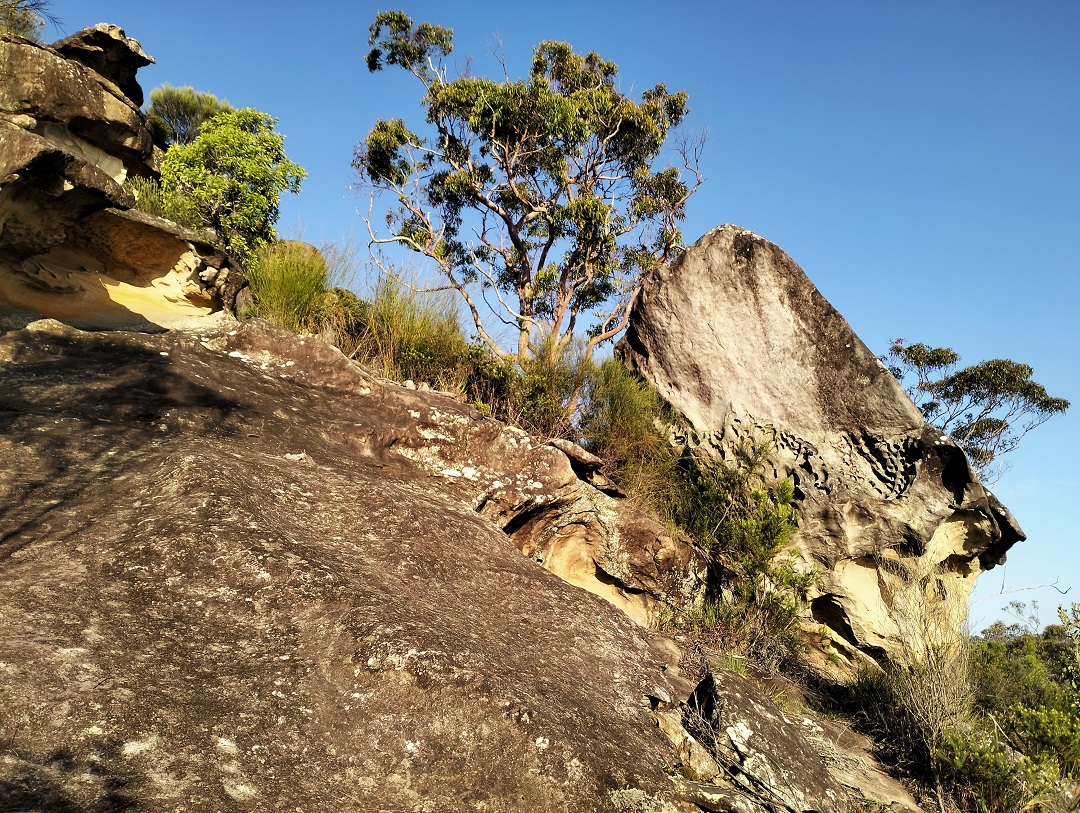
Typical Hawkesbury Sandstone escarpment - Hawkesbury Soil Type
Photos; Jayden Walsh.